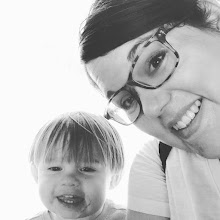A lot is changing in my life right now, or has changed in the last year plus. A lot of that has to do with this little dude.
I had always said that "I want to be healthier and fit for the sake of my children because how can I convince them that something is good for them if I'm not living that way?" This same sentiment applies to basically everything. If I spend no time in prayer, how can I convince my kids that it's important? If I spend no time caring for the poor and underprivileged, how can I convince my kids that it's important? If I spend no time reading instead of watching TV...etc etc etc. It's not about faking it to try to get them in line. In fact, it's the opposite. If these things are actually important to me, then they'll be showing up in my life; I won't have to tell my kids what I believe is important, they'll see it as they watch me live my life. This is not about a facade and then it's also not about seeking perfection, which is very easy for me to resort to. There must also be grace, getting a donut on a rough day, and a lot of confessing my shortcomings--which are also things I want to live out with my kids.
So, this journey of seeking to put rubber to the road of what I know is good for us and then actually doing it is multi-faceted. One of those facets is seeking manageable and repeatable ways to make healthy eating and living choices. There are two main ways I'm seeking to do this. The first is something I'm going to be spending a lot more time with in other blog posts because a) I have a baby who is probably only content for another 15 minutes in his exersaucer and b) I'm not knowledgeable enough to even write a coherent post. I have recently started what I will call an "Oily Journey" into essential oils through Young Living. And when I say start, I really mean I just started--I just opened my starter kit box last night. I am planning to use this blog to help chronicle that journey, but I may start a new blog altogether for that. All of that = TBD.
The second way I am seeking to make easy, daily changes is smoothie making. I feel really late to this game, but here I am nonetheless. Making smoothies will not be just about meal replacement for weight loss/management, but a way for me to make sure I am getting a well-rounded intake of vitamins, minerals, etc. in a time in my life where it is impossible to do so through thorough menu planning/cooking. I am also a firm believer that although taking vitamins/supplements are a good thing, it is so much better for you (and more enjoyable) to get these things through real food. For now, I am getting a lot of my research done through this book:
It is called More Smoothies for Life by Daniella Chace. I chose this book because it seemed to fit best what I was looking for while in Barnes & Nobles one night--recipes as well as explanations of the ingredients--and it had good reviews on Amazon. There might be a better resource out there, but this is where I have chosen to start.
With all that being said. Here is my first smoothie. Well, first as a part of this journey. (I have got to get into a thesaurus to find more words for the word "journey.")
BLUEBERRY PINEAPPLE SMOOTHIE
Frozen blueberries
Frozen pineapple
1/2 cup-ish cottage cheese
1 cup-ish milk
2 tbsp ground roasted flax seed
2 tbsp wheat germ
4 drops liquid stevia
I didn't use any measuring tools except for the tbsp with the wheat germ and flaxseed. I just sort of put it all together until it seemed like a good texture for me. The flavor is sort of granola-y because of the wheat germ and flaxseed, which I like since I had it as a breakfast smoothie. Now, a little bit about why I chose these ingredients:
MILK: I needed a liquid, and because it has calcium
BLUEBERRIES: well, yum, but also because of antioxidants and phytochemicals--I didn't know that word until I started reading this book. According to Chase, phytochemicals are "naturally occurring plant chemicals" that are having studies done revealing that they can at times be more powerful in preventing or healing diseases than "pharmaceutical agents" (p. 2).
PINEAPPLE: again, yum, and for vitamin C and the enzyme bromelain, which possibly reduces inflammation in the body (p. 286).
COTTAGE CHEESE: a non-powder form of protein--it has 14g of protein in just a 1/2 cup
FLAXSEED: omega-3 fatty acids & magnesium; good for inflammation & releasing toxins (p. 118).
WHEAT GERM: vitamin E and CoQ10; has cysteine, which is "an amino acid that plays a major role in removing heavy metals and environmental toxins from our bodies" (p. 32). note: I was unable to get this at Trader Joe's, which surprised me, but I found it at Target with things like oatmeal.
STEVIA: calorie free, natural sweetener; at some point (not in this book but online, so who knows?) I read that stevia can help with regulating blood sugar and cholesterol


















